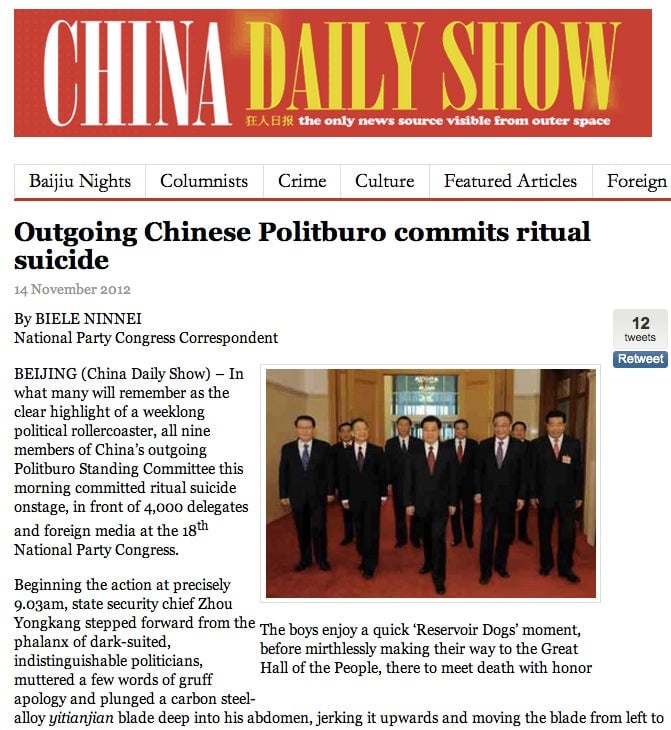Mass suicide in the Politburo, Hu Jintao’s original speech, and other stories that make us rethink China coverage
Incisive, attuned to the cultural and political context of China… and completely fictional. Since its founding in 2010, the satirical news site China Daily Show (CDS) has become an institution among English-speaking foreigners in China.

Incisive, attuned to the cultural and political context of China… and completely fictional. Since its founding in 2010, the satirical news site China Daily Show (CDS) has become an institution among English-speaking foreigners in China.
Styled to look like government-owned publications such as the Global Times, the site satirizes Chinese state media, Chinese officials, and foreign media (a blurb on the site clarifies that it is not associated with either the state-owned paper China Daily or the American Daily Show). One tongue-in-cheek story, “Beijing bureau chief admits he doesn’t have a fucking clue what is really going on,” was retweeted by real Beijing bureau chiefs like Barbara Demick of the Los Angeles Times and former Washington Post bureau head Philip Pan.
CDS covers regular news like the end of the 18th party congress on Nov. 14 and the country’s once-in-a-decade leadership change with both absurd and sometimes disturbing fake stories. Its headline article today reports in graphic detail how China’s Politburo committed ritual suicide. Another claims outgoing President Hu Jintao originally planned an inspirational, “potentially seismic” speech for the first day of the congress. After leaving the speech in the car, Hu was forced to deliver the 101 minute work report that the world saw instead.

The paper also pokes fun at what it calls “self-important foreign voices.” It published a raucous but telling “Dear Zhang” letter from a fictional foreigner who has decided to “break up with a China,” a week after a British businessman published a lengthy editorial on why he was leaving China in the UK’s Prospect magazine.
CDS’ Chinese name, 狂人日报, translates to “Madman Daily,” using characters from the title of the famous short story “Diary of a Madman,” 狂人日记, by Chinese writer Lu Xun. The story follows a man paranoid that his family and fellow villagers are cannibals. Considered to be a criticism of feudalism and traditional Chinese values like filial piety, the story formed a core part of China’s new culture movement that in part encouraged young people to think for themselves.
The site’s riffs on clichés in China reporting serve as a call on foreign journalists to think more independently as well. One story headlined “Ai Weiwei grants rare non-exclusive interview” makes fun of the many journalists who quote the Chinese artist and dissident. Another story on foreign journalists flown in to cover the congress highlights the constant search for the next sensational China story. A dialogue between a cameraman and reporter by the name of Sykes refers to thousands of Chinese villagers who contracted AIDS in the 1990s:
“There’s an AIDS village about 30 miles outside Beijing,” suggests cameraman Peter, as the crew awkwardly relax in a cramped Dashilar coffee shop.
“We didn’t travel 2,000 miles to cover another AIDS village,” Sykes angrily snaps in reply. “Look, sorry, Peter… I’m just tired. And frankly bored of this.”
Although most readers easily catch on to CDS’s humor, likening the site to the Onion (CDS’s creator, allegedly an anonymous British expat, compares the publication with British magazine Private Eye), the humor is inevitably lost on some. One commentator responded to the story on the fictitious Beijing bureau chief saying, “This guy sounds like an idiot, no wonder he works for an American newspaper.”